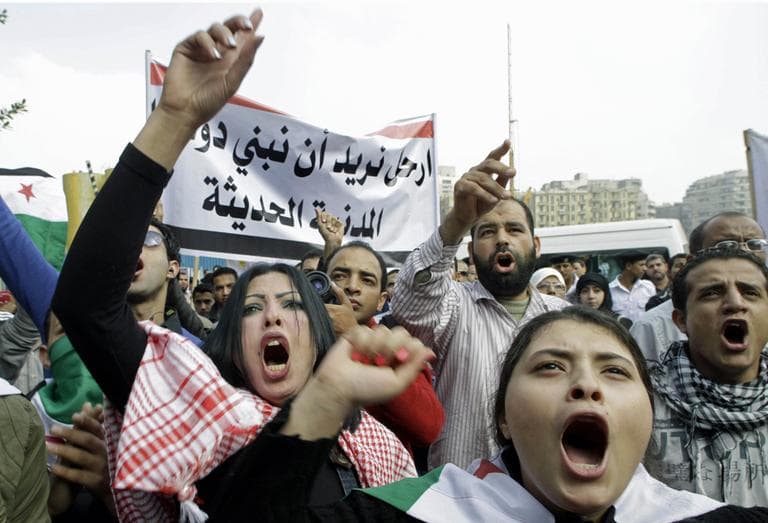Advertisement
Syria And The New Middle East
ResumeJacki Lyden in for Tom Ashbrook
Syria’s uprising may be going from slow burn to full on civil war. The latest news on that story, and what it means, big picture, for the U.S.

The Syrian conflict has been going on for eight months with no end in sight. Only last spring, U.S. policy makers viewed Bashar Al-Assad as a reformer--a perception that quickly changed as tanks rolled into Syrian cities.
Now, the Arab League itself has suspended Syria for bloody repression against its own citizens. Syria dwarfs Libya as a geopolitical concern but the U.S. and NATO are not talking about intervention. At least not yet. And if Syria’s leaders fall, where does that leave its shadowy supporter: Iran?
This hour On Point: the Syrian problem and U.S. strategy.
-Jacki Lyden
Guests
Nada Bakri, reporter for the New York Times.
Robin Wright, a journalist, author and foreign policy analyst.
Karim Sadjadpour, an associate at the Carnegie Endowment.
Highlights
The conflict in Syria is growing in intensity, even as the nature and role of the opposition forces is unclear. In a country riven with sectarian divisions, there are numerous factions vying for power inside Syria.
What has become clear, however, is a likely outcome. “There is a general sense in the United States and analysts in the region that president Bashar Al-Assad cannot survive this crisis politically, but he can string it out in a way that thousands more people will die in the months ahead,” said Robin Wright, a journalist, author and foreign policy analyst.
For the United States, the issue of Syria is closely tied with its most powerful backer, Iran.
“The Assad regime in Syria is not only Iran’s most important ally in the Middle East, you could argue that on a global level, it has been an absolutely critical relationship for the Islamic Republic,” said Karim Sadjadpour, an associate at the Carnegie Endowment for International Peace. Iran is “doing everything that it can to make sure that the Assad regime does not fall, offering them financial credits, subsidized oil,…to offering strategic and tactical advice on how to quell the uprising.”
But the regime, Syria might be beyond saving. “It has reached such a point in Syria, where I think that the Iranian government has been forced to contemplate the collapse of the Assad regime,” said Sadjadpour. He pointed to news reports of Iranian officials actually meeting with elements of the Syrian opposition in recent weeks.
Meanwhile, the attacks in recent weeks inside of Syria are growing in number. “The nature of them is so brazen recently and so courageous,” said Nada Bakri, reporter for the New York Times. However, Bakri added, the reporting of attacks has been incomplete: it is often unclear which factions are behind which attacks.
From The Reading List
Foreign Policy "In the early morning hours of Nov. 16, Syrian army defectors staged a daring raid on an Air Force Intelligence Directorate complex on the northern edge of Damascus. Employing heavy weapons and machine guns, the attack not only shook the Syrian capital, it struck at the heart of the regime — the air force was former President Hafez al-Assad's base of support when he seized control of the Syrian state in 1970 — and during the current unrest its intelligence services have been used to squelch dissent within the armed services.
Tehran Times "Syrian government has decided to boycott an Arab League meeting due to be held in the Moroccan capital, Rabat, a Syrian foreign ministry official says. "
Reuters "Growing Syrian army defections do not yet pose a mortal threat to President Bashar al-Assad, but outside support could turn the dissidents into a national insurgency able to harass and exhaust his military."
This program aired on November 21, 2011.